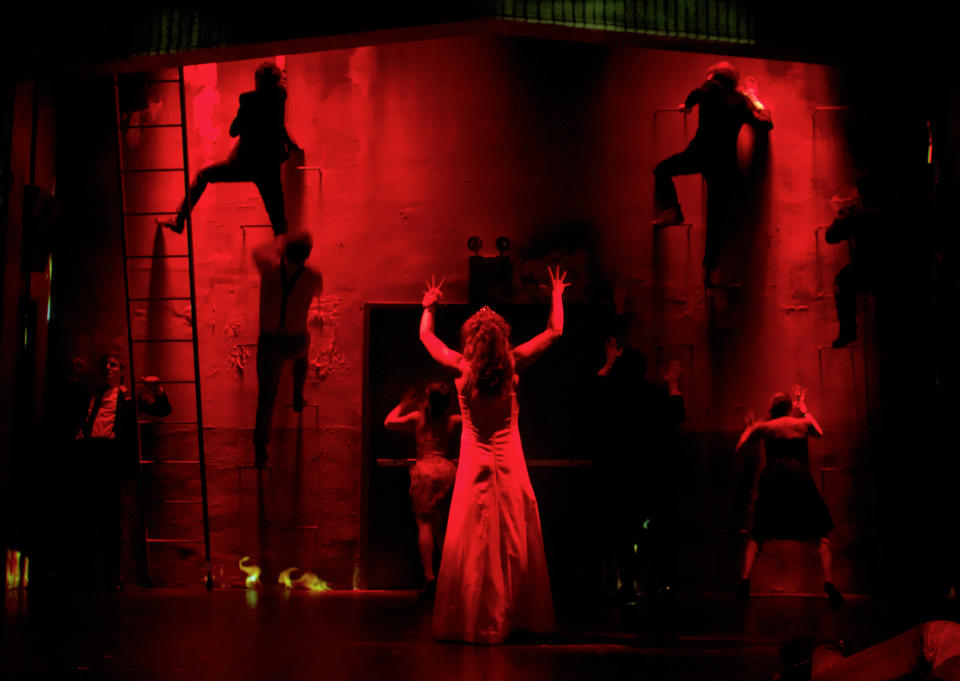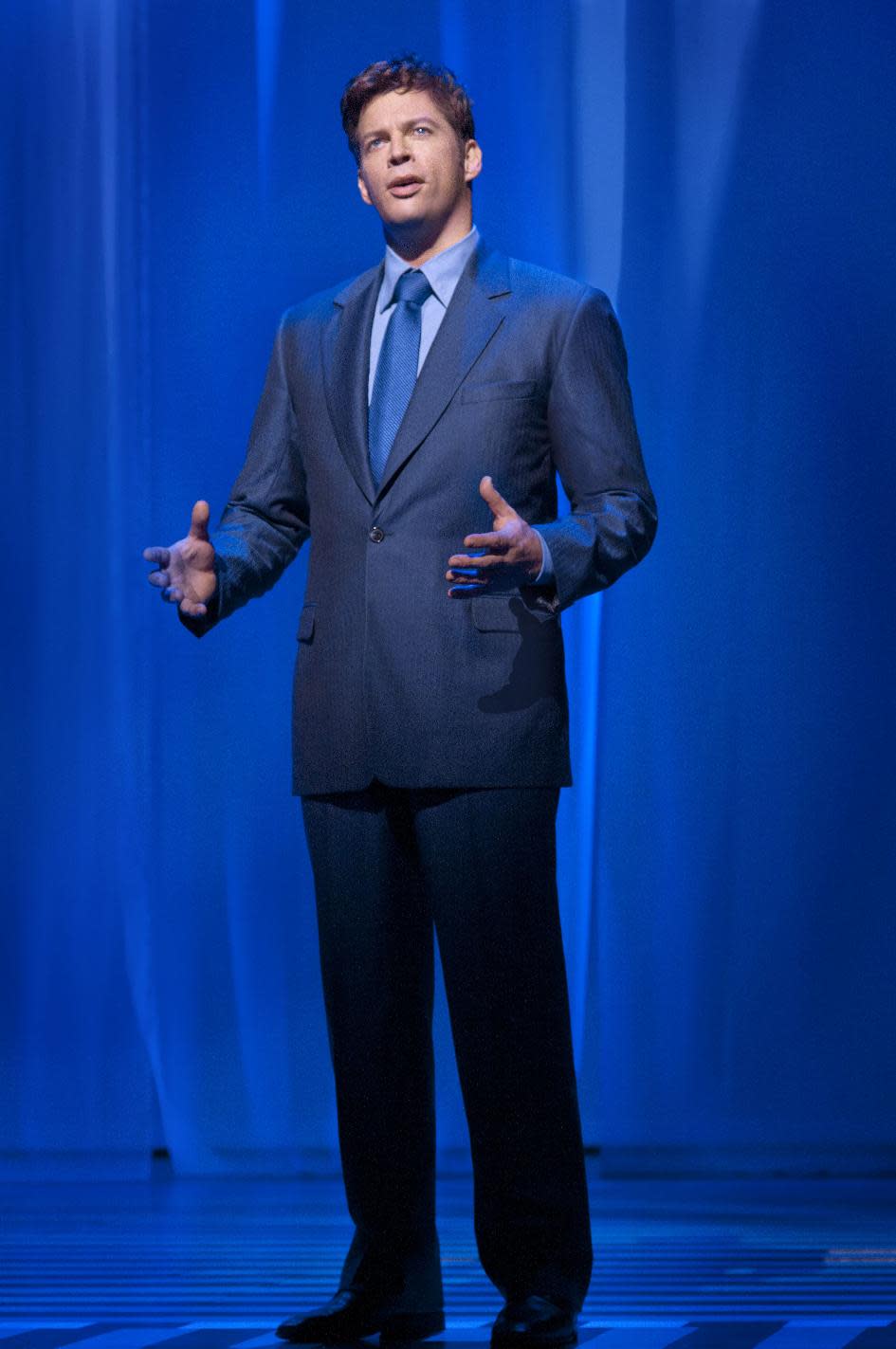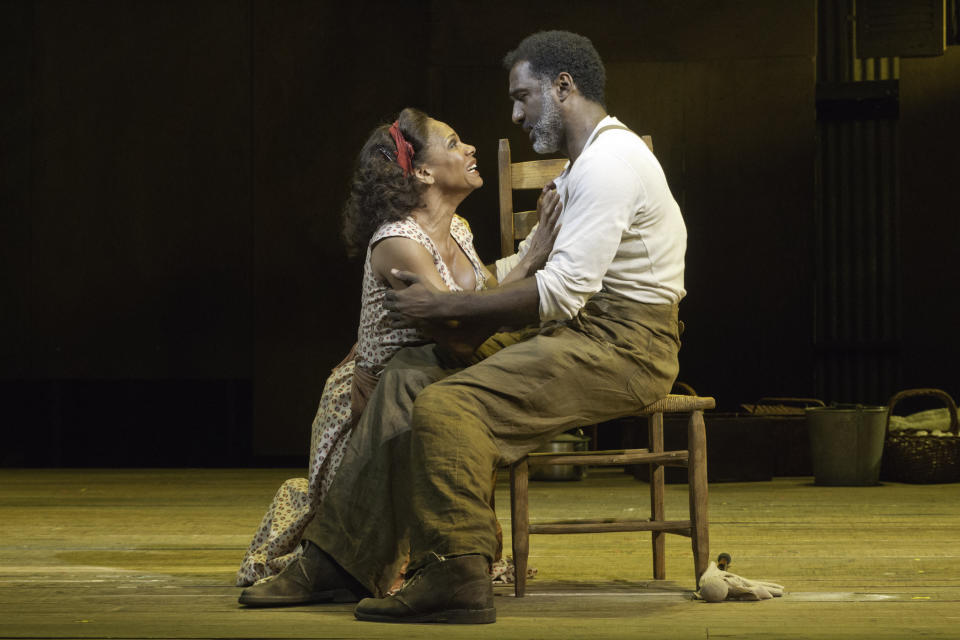Folks behind 'Carrie' return to boldly re-imagine
NEW YORK (AP) — When the musical "Carrie" had a sudden early death on Broadway in 1988, few were as unhappy as three men who worked hard to give it life.
Lawrence D. Cohen, Michael Gore and Dean Pitchford, who wrote the book, music and lyrics, clearly weren't happy with the final product, which closed after five regular performances, lost $8 million and became the most expensive flop in Broadway history at the time.
Despite offers to produce the show elsewhere, the trio refused. "We had no desire or intention to re-experience the 'Carrie' that closed on Broadway in the state that it was in ever again," said Cohen. "If we were ever to see it again, we were determined to go back to work on it and get the show that was in our heads."
That day, he said, has now dawned — 24 years later.
A new version of the show that became a yardstick for failure — critic Ken Mandelbaum named his book about stage failures, "Not Since Carrie: Forty Years of Broadway Musical Flops" — opens Thursday off-Broadway at MCC Theater.
"We've gone back and looked at every single inch — even numbers that were working fine — to see if we could do better, if they could be deepened," said Cohen. "It was important to look at everything and scrutinize it from that perspective."
There may be few more fraught undertakings in the theater than what Cohen and his team have done — the so-called "re-imagined" work. Reinterpreting a classic work, even if the original was a dismal failure, is a risky business.
The new "Carrie," directed by Stafford Arima, will be the third high-profile re-imagined musical in New York this season, following the reworking of "Porgy and Bess," which is a hit, and "On a Clear Day You Can See Forever" with Harry Connick Jr., which failed.
Diane Paulus knows all too well what that nervous "Carrie" team is likely going through, having survived what she called the "lion's mouth" of critical bashing even before her re-imagined "Porgy & Bess" made its way to New York.
Paulus, the artistic director of the American Repertory Theater, adapted the Gershwin opera for the Broadway stage with Pulitzer Prize-winning playwright Suzan-Lori Parks and Obie Award-winning composer Diedre Murray.
The team condensed the four-hour opera into a two-and-one-half-hour musical, eliminated a lot of the repetitiveness and tried to deepen the characters. Their effort generated headlines when purists including Stephen Sondheim complained that a musical treasure was being corrupted.
"People maybe interpreted that we were saying we thought we could do something better than the opera or could replace it, but that was never the intention," Paulus says by phone from Montreal, where she's directing the Cirque du Soleil show "Amaluna."
"We all hope that people will see the work and see the work with an open heart and see the work as what it is," she adds. "Whatever happens, the classic texts will always live because that's what makes it a classic."
The controversy actually may have helped sell tickets on Broadway. "The Gershwins' Porgy and Bess" opened in January starring Audra McDonald, David Alan Grier and Norm Lewis to strong reviews and has been extended to September.
"What kept me focused throughout this journey and the process was the commitment to the work and just feeling clear that the work had to speak for itself," said Paulus, but adds with a laugh: "Maybe we should have never talked about anything prior to the show being done."
The other side of the "re-imagined" coin was the failure of Connick's show, which only played 29 previews and 57 regular performances. Like "Porgy & Bess," more than a scalpel was used on the original 1965 musical "On a Clear Day You Can See Forever."
The classic version — turned into a 1970 film with Barbra Streisand — was about a psychiatrist who fell in love with a woman from one of his patient's past lives. Michael Mayer, the director behind "Spring Awakening" and "American Idiot," revised it so that the female therapy patient was now a gay man who used to be a woman.
Connick was a fan of the music, but not of the original story. "It didn't make any sense," he said in an interview in December before the show opened. He said he would not have been part of the show unless changes were made.
"For all intents and purposes, this is a new show. I mean, it's completely redone, re-conceptualized," he said. Critics and the audience agreed, but they were even more confused by the gender switching and the show closed early.
Revising, reinventing or reworking shows is, of course, nothing new. Irving Berlin's "Annie Get Your Gun" was edited to remove stereotypes for a 1999 revival and some of Sondheim's own lyrics for "West Side Story" were translated into Spanish in 2009. The current revival of "Godspell" has been rejigged to include jokes about Steve Jobs and Charlie Sheen.
But the long road back for "Carrie" must be perhaps the bravest. After all, the original creative team has returned to the scene of the crime and rolled up their sleeves to look again at the story of a bullied teen with telekinetic powers who struggles against her overbearing mother.
One of the driving forces behind the re-imagining is Arima, who saw the original much-maligned production when he was a 19-year-old visiting from Toronto with his mother for a blitz of theater. On April 30, 1988, the pair went to see "Carrie." He recalls a great score marred by terrible production flaws — pyrotechnics, strange effects and overwrought costumes.
"The main thing I remember about experiencing 'Carrie' was the audience," he recalled. "There was such a visceral response and I'd never been to something where the roars of reaction were very, very clear."
Arima didn't give it another thought until the death of his mother in 2008. As he dealt with his grief, he recalled her gift to him of loving the theater and "Carrie" popped into his mind.
"The character of Carrie was misunderstood, and I believe that the musical of 1988 was also misunderstood," he said. "It wasn't intended for people to laugh at it or even to laugh with it. The story at its core is a serious piece."
Arima contacted the original creators at a time when they, too, were thinking about revisiting the flop, which suffered from an inexperienced creative team and a flighty producer. A quick initial meeting turned into a 10-hour discussion the next day as they re-examined every page of the script.
"With the right alignment of creative forces, we decided to take a leap of faith, jump off the cliff and say, 'We're going to re-explore and reinvent this piece for today in a way that highlights the story, focuses in on the relationship between mother and daughter and allows this really exciting score to be heard,'" said Arima.
The re-imagined "Carrie" has new songs, a different structure, and the story is told from a different point of view. It also teases out two themes that seem very current: bullying and religious fundamentalism.
Arima said he was unwilling to just tinker with a couple of notes or a couple of scenes but wanted to really give the reworked musical "Carrie" its own identity separate from Stephen King's novel, the 1976 film directed by Brian De Palma and starring Sissy Spacek, or the 1988 musical.
"What I've never been a fan of — and not just with 'Carrie' but anything — is if you take source material that was a film or a novel and you merely put that film or novel onto the stage, you're doing a disservice to the theater audience," he said.
Cohen said there are lessons he's learned that could apply to all re-imagined shows: Try as best as you can to get the piece onstage to match your vision. Go back to the original story. And don't be scared of ripping it all up and starting over.
He thinks he and his team have done that now.
Finally.
"I don't think we wanted vindication per se at all. I think we wanted to see the vision irrespective of the world, irrespective of the critics which we can't control, irrespective of anything. We wanted to see the version of it that we hadn't seen."
___
Online:
http://mcctheater.org
http://www.porgyandbessonbroadway.com
___
Follow Mark Kennedy on Twitter at http://twitter.com/KennedyTwits



